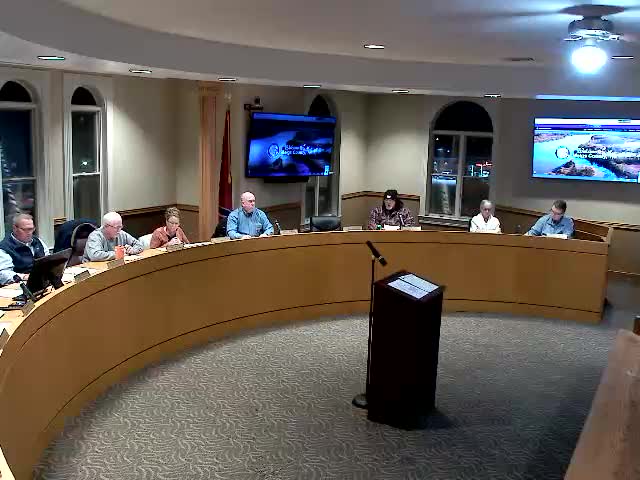Meigs County workshop weighs change to 300-foot beer setback for Pleasure Isle applicant
Get AI-powered insights, summaries, and transcripts
Subscribe
Summary
Meigs County commissioners at a workshop discussed a request to modify a longstanding county rule that requires beer-selling establishments be at least 300 feet from private residences.
Meigs County commissioners at a workshop discussed a request to modify a longstanding county rule that requires beer-selling establishments to be at least 300 feet from private residences.
Dustin Jenkins, who presented the request on behalf of an applicant, told the commission the 300-foot rule dates to 1996 and asked that it be changed or eliminated. Jenkins said he did not intend to open a bar at the site and instead planned only packaged-beer sales. “I don't even want a bar. I want some packaged beer,” Jenkins said.
Why it matters: the 300-foot setback has been applied in Meigs County since 1996, and commissioners said the rule has been used to prevent bars near homes. Removing or altering the setback would change how future beer applications are reviewed and could affect neighbors near the proposed site.
Key discussion and details
- Applicant and site: The application under discussion concerns the Pleasure Isle building; the applicant, Danny Pilkey, was not present and told county staff by text that he had an emergency and would not attend. Pilkey previously held a license that had expired, and commissioners said that prior approvals may have been grandfathered in other cases but that Pilkey’s previous grandfathering had lapsed.
- Requested change: Jenkins asked the commission to eliminate or modify the 300-foot residence setback. He said he had sought but could not locate original paperwork from the 1996 action and urged the commission to consider changing the rule so it applies differently to on-site consumption versus packaged sales.
- Legal and procedural limits: The county attorney told the commission that state opinions indicate counties may adopt rules on local beer licenses and that a uniform treatment of on-premises and off-premises sales can be legally required; the attorney described state guidance as persuasive but not binding. The attorney also advised that if the county chooses to change the rule it should follow any required public-notice procedures. A subsequent discussion of notice included a county legal reference to a Court of Appeals opinion that public notice must be “conspicuous,” reasonably describe the action, and be posted in time to allow community members to attend. The attorney said posting on the county website would likely satisfy that standard.
- Neighbor outreach and grandfathering: Commissioners and staff reported contacting nearby residents in prior cases. Jenkins said he spoke with neighbors closest to the site. Commissioners noted that some past applications (they estimated about 25 in the last 10 years) had required outreach to adjacent residences and churches, and that some approvals had been treated as grandfathered; Pilkey’s prior license, however, had expired and would not automatically be grandfathered.
- Related land-use step: Staff noted Pilkey’s property was scheduled to appear before the planning and zoning board to request a zoning change (from FAR to commercial, per the agenda text). Planning and zoning review would be a separate step before any county action on a beer permit.
Outcome and next steps
No formal vote was taken at the workshop. Commissioners said they would put the request on the agenda for a vote at the next meeting after completing required notifications and confirming any legal notice requirements. The planning-and-zoning rezoning request will be considered separately according to the agenda.
Ending
Commissioners directed staff to ensure appropriate notice and outreach before any change to the 300-foot rule is considered for a vote. The item was scheduled for a formal vote at the commission's next regular meeting.
